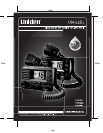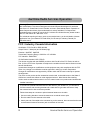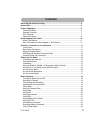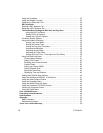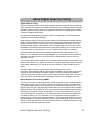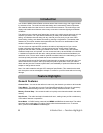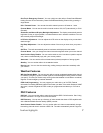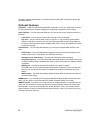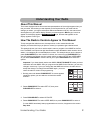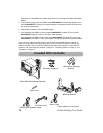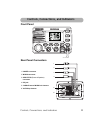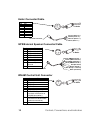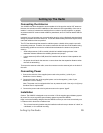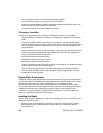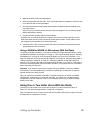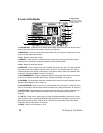
5
About Digital Selective Calling
Digital Selective Calling
DSC is a technique used by marine radio systems to augment calling the another station by
voice. It permits other vessels to be called up by keying in a unique identity number known as
the MMSI. It also provides a button that will generate a distress alert identifying the vessel in
distress, the nature of the problem and a position derived from an installed, optional Global
Positioning Satellite (GPS) device.
The feature was implemented in February 1999 as an integral part of the Global Maritime
Distress and Safety System (GMDSS).
Digital Selective Calling (DSC) lets mariners instantly send automatically formatted distress
alerts to rescue authorities anywhere in the world. Digital selective calling also lets mariners
initiate or receive distress, urgency, safety and routine radiotelephone calls to or from any
similarly equipped vessel or shore station, without requiring either party to be near a radio
loudspeaker. DSC acts like the dial and bell of a telephone, allowing you to “direct dial” and
“ring” other radios, or allow others to “ring” you, without having to listen to a speaker.
Your radio's DSC Call feature lets you transmit and receive DSC Calls based on ITU-R
M.493-11. For a detailed discussion of this standard, you can refer to the following web site
document: http://www.gmdss.com.au/ITU%20DSC%20tech%20spec.pdf and read a full
explanation on line.
If you have an optional GPS installed, you can send a distress message in an emergency sit-
uation which includes your position. You can also send and receive position data to and from
other vessels. Additionally, you can set up and use a directory of other vessels with DSC
radios.
The radio's NMEA input and output feature lets you display and use vessel
information. When equipped with an optional GPS, the UM625c can send and receive DSC
calls that include the following information: distress, individual, individual ack(nowledge-
ment), all ships, group, position request, position reply, and position send. DSC calls to your
radio can receive include distress ack, geographic, distress relay, and distress relay ack.
Mobile Maritime Service Identity (MMSI)
This refers to a unique nine digit identification number designated for each qualified vessel or
shore station. It is in a way, a maritime equivalent of a telephone number. You must obtain
your personal MMSI before you can program and or transmit data mentioned above. If you
have access to the web, open either http://www.boatus.com and navigate to the convenient
MMSI application form provided. Or, go to http://www.seatow/boatingsafety/mmsi/mmsiReg-
ister.asp and complete the on-line form provided. If you do not have web access, you can
call, toll free, BoatUS, in Alexandra, VA at 1-800 563-1536 and request that the MMSI form
be mailed or faxed to you. This presumes you use a recreational vessel in domestic U.S.
waters and that you are not otherwise required to be licensed. Because BoatUS is set up to
take advantage of an electronic registration system, using standard mail or fax will be much
slower. You can also call the FCC Forms Distribution Center at 1-800 418-3676 who then will
provide you with the form types they require.
About Digital Selective Calling
About Digital Selective Calling



